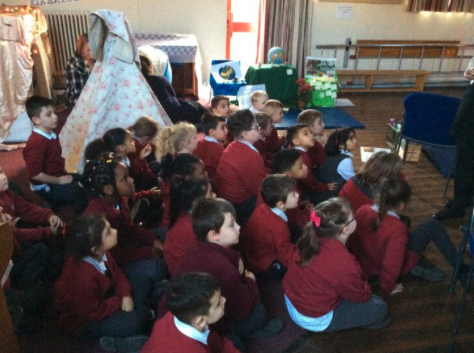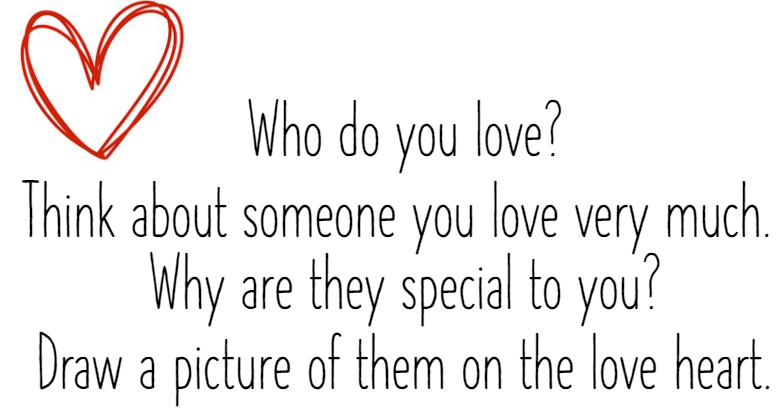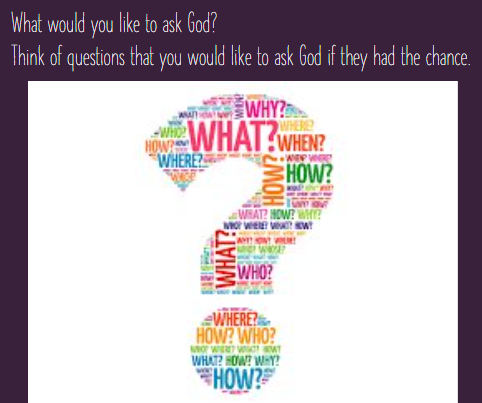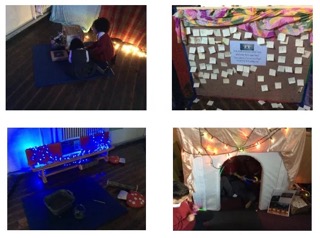Being a Church School
Collective Worship
“inclusive, invitational, inspiring”
As a Church School, we hold a daily act of Collective Worship for our pupils where we gather, engage, respond and send. Worship is Christian in nature and has regard for the family background and the ages and aptitudes of our pupils.
Collective Worship provides the opportunity to worship God within the rich tradition of Christian prayer and worship. We aim to foster a sense of fellowship by bringing all members of our school community together each day for times of celebrating, sharing, reflecting, responding and praying in an open and sensitive climate. Individuals are invited to explore and deepen their spirituality and to respond both in their own lives and within the community.
Through Collective Worship we aim to strengthen a sense of belonging and a sharing of values, including Christian, School and British Values. In addition, we aim to stimulate the spiritual, moral, social and cultural development of our pupils. Through Worship, individuals will develop an understanding of God as revealed in Jesus Christ, hear and respond to the teachings of the Bible, experience prayer and prepare for their daily experiences and responsibilities with the belief that God is involved in every area of life.
Our Acts of Worship contain elements of the following:
- Consideration of, and response to, the life and teaching of Jesus Christ.
- Knowledge and appreciation of the Bible.
- Praise and prayer to God.
- Exploration of the symbolism within the Christian faith and the Anglican tradition.
- Respect and tolerance for people of all faiths, races and cultures.
- Promotion of fundamental British Values.
- Participation in hymns and songs.
- Invitations to participate and observe.
- Recognition of, and response to, the spiritual dimension of human experience.
- Ritual and ceremony, stillness and reflection.
Worship is led by a wide range of members of our teaching and leadership team with contributions also being made by the children. We benefit from regular Christian visitors who lead our worship, including staff from St Barnabas Church, the CSALT team (Christian School Assembly Link Team) and the CAT team (Christian Assemblies Team). Pupils and staff are involved in evaluating the effectiveness of Worship.
Some of our Acts of Worship take place at St Barnabas Church, where parents are invited to join us as we celebrate important times in the school and Church year, including Harvest Festival, Christmas and Easter.
If a parent of a pupil requests that their child be wholly or partly excused from attendance at religious worship at the school, the pupil will be excused until the request is withdrawn.
Our Collective Worship Policy can be found here.
Church Links
We have a very close link with St Barnabas Church and we hold numerous services across the year in the church including: Christingle, Easter Service and our Nativity performances.
Please click here to view their website
The church also run Little Frogs: a Pre-school gathering for activities and worship, held weekly in term-time. Thursdays 2.00pm - 3.00pm with singing, stories, craft activities, and thank-you prayers.
Religious Education
At St Barnabas, we believe that Religious Education plays a significant role in the promotion of spiritual, moral, cultural and mental development, preparing learners for the opportunities, responsibilities and experiences of later life and helping them to become successful learners, confident individuals and responsible citizens.
We follow the Understanding Christianity scheme of work for our teaching of Christianity. This is supplemented by the Diocese of Peterborough Syllabus for Religious Education 2019 – 2024, which is mainly used for the teaching of other world faiths.
The syllabus aims for pupils to explore core Christian concepts by using important teachings from Bible texts, making sense of them and understanding the impact of these texts and concepts on Christians today.
Religious Education is taught weekly as a discrete subject. As a Church of England school, we prioritise the teaching of Christianity, which accounts for two thirds of our programme of study. Further units of study provide in-depth coverage of other major religions.
Through RE lessons, we help children to both learn about and to learn from religion and belief. The units of study are all question-based and lessons are planned which allow children to be active, thoughtful, reflective and expressive in their handling of questions about beliefs, religion, spirituality and values. We aim to include elements of enquiry, analysis, interpretation, evaluation and reflection within our lessons.
We use a varied range of teaching and learning strategies in order to make Religious Education dynamic and challenging for all pupils. These include whole class lessons, pair and group discussions, drama, role-play, ICT, visits, outside speakers, audio-visual stimuli, artwork and the use of religious artefacts.
Religious Education must be provided for all registered pupils in full time education. Parents do, however, retain the right to withdraw their children from RE. If you have any concerns, in the first instance we would encourage you to talk to your child’s class teacher who can direct you to the RE Subject Leader if you need further information.
Religious Education Policy - Appendix
National Society Documents
'Valuing all God's Children' Document
The Church of England's Guidance to Sex and Relationships Education
The Church of England's Mental Health and Well-Being Guidance
Spirituality
Spirituality Day – Wednesday 10th January 2024
At Freeman’s Endowed and St Barnabas Church of England Primary Schools we have recognised the importance of supporting our children to grow and flourish spiritually. We have looked at specific ways that we can support the spiritual growth of our children and we began by considering what spirituality means to each of us.
Defining spirituality proved challenging for all of us! However, we all agreed that spirituality involved an awareness of something greater than ourselves. We also recognised that it involved moments and experiences of awe and wonder in our own lives and in the wider world, and involved connection and reflection. We shared some definitions of spirituality, as well as attempting our own: We finally agreed on the following definition:
"We define spirituality as: an awareness of something greater than
ourselves, experienced through reflection and connection. Spiritual
development can also involve unique experiences of awe and wonder,
an understanding of ourselves and our connections with others, as well
as seeing and relating to the physical and creative world''
On Wednesday 10th January, both St Barnabas and Freeman’s schools held a Spirituality Day. The day was introduced in Collective Worship and together we discussed what spirituality meant to us. We talked about ‘Wow, Ow and Now’ moments and how we respond to those different moments in our lives.

During the day the children spent time in the hall where there were different spiritulaity activities set up. These included activities where children could think about different Ow, Wow and Now moments in their own lives and the lives of others.



The children found the activities thought-provoking and really valued the time they had to reflect and think. Below are some of the responses the children gave and photographs of them taking part in the activities...
Below are some of the children’s responses to the different activities from throughout the day...

Reception
The children in Owl and Hegdehog classes explored the big question, “What makes us say WOW?” The children went on a walk around the school grounds and took time to really ‘notice’ and pay close attention to wonders of nature such as birds flying, branches dancing in the wind and feathers falling. The children simply took time to enjoy outside, to admire and wonder at the natural environment. They then used watercolour paint to represent their findings and paint the things they observed that made them say ‘wow’!
We also discussed what we were thankful for, the children discussed in groups things in their lives that they are thankful for. We then drew it onto leaves for our thankfulness tree. The children came up with various ideas such as: toys, teachers, parents, pets and school dinners!
Year 1
In Squirrel class we looked at the amazing patterns we find in the nature around us and tried hard to replicate them. The children enjoyed looking through magnifying glasses at leaves and plants. We also looked at some pictures of animal patterns of animals that we wouldn’t find in our local environment. The children loved seeing some of the more unusual animals.
Year 2
In Kingfisher Class we considered some of the big questions and thought about the answers, listening to and considering the ideas of others. We thought about what makes us say WOW and produced some lovely artwork.
We also thought about what was threatening our planet and came up with lots of ideas, such as plastic in our oceans which is harming fish and sea creatures, people leaving litter and not recycling as well as people driving cars constantly when they maybe could walk so pollution would be reduced and air quality improved.






